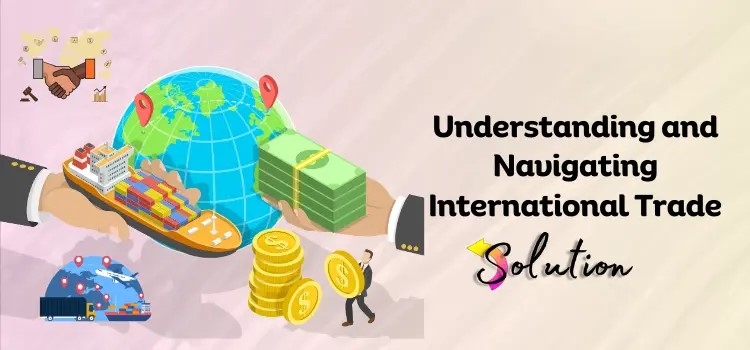What is International Trade? A Comprehensive Guide

Understanding International Trade: Definition and Scope
International trade refers to the exchange of goods, services, and capital across international borders or territories. This global commerce system is fundamental to the economic growth and prosperity of nations, enabling countries to obtain goods and services that are either not available domestically or are available at a lower cost from abroad.
The scope of international trade is extensive—it encompasses exports (selling to other countries) and imports (buying from other countries). This interplay of trade dynamics facilitates economic specialization, enhanced productivity, and increased market efficiency across the globe.
The Importance of International Trade in the Global Economy
International trade is a cornerstone of globalization and serves as a key engine for economic development. Countries engage in trade to:
-
Access a broader range of goods and services
-
Acquire raw materials not found domestically
-
Promote industrial growth through access to foreign technology and capital
-
Generate employment through export-driven industries
-
Strengthen diplomatic relations via trade partnerships
Without international trade, countries would be constrained to domestic production capacities and limited technological advancement.
Key Concepts in International Trade
Comparative Advantage
Comparative advantage occurs when a country can produce a good or service at a lower opportunity cost than another country. This principle, introduced by economist David Ricardo, forms the basis for specialization and efficient trade. Nations benefit from focusing on producing what they are relatively better at and trading for the rest.
Balance of Trade
The balance of trade (BOT) is the difference between a country's exports and imports. A positive BOT (trade surplus) occurs when exports exceed imports, while a negative BOT (trade deficit) arises when imports outpace exports. This metric is vital for assessing a nation's economic health.
Trade Barriers
These include tariffs, quotas, and non-tariff barriers, which governments use to control the amount of trade across borders. While sometimes necessary to protect local industries, excessive barriers can distort market efficiencies and provoke retaliatory measures.
Major Theories of International Trade
Mercantilism
This early trade theory suggested that a country's wealth is measured by its stockpile of gold and silver. Countries aimed to maximize exports and minimize imports to achieve a trade surplus.
Absolute Advantage
Proposed by Adam Smith, this theory posits that a nation should produce only those goods in which it is most efficient and trade for others.
Heckscher-Ohlin Theory
This model explains that countries export goods that use their abundant and cheap factors of production and import goods that use their scarce factors.
Types of International Trade
Bilateral Trade
Trade between two countries, often governed by agreements that reduce tariffs and enhance cooperation.
Multilateral Trade
Trade involving more than two countries, typically under international organizations like the World Trade Organization (WTO).
Intra-industry Trade
This occurs when countries simultaneously import and export similar kinds of goods, such as cars or electronics, reflecting consumer preference diversity and specialization.
Benefits of International Trade
-
Economic growth: Trade opens new markets, increases revenues, and supports GDP expansion.
-
Consumer benefits: Access to a wider variety of goods and services at competitive prices.
-
Technology transfer: Exposure to innovations and modern industrial methods.
-
Employment opportunities: Export-led industries generate jobs.
-
Enhanced competition: Forces domestic producers to innovate and improve efficiency.
Challenges and Risks in International Trade
Despite its advantages, international trade is fraught with challenges, including:
-
Exchange rate volatility: Currency fluctuations can impact trade profitability.
-
Political instability: Disruptions in trade policies and diplomatic tensions can affect trade agreements.
-
Trade protectionism: The resurgence of tariffs and quotas can hamper global commerce.
-
Logistical complexities: Shipping, customs, and compliance create operational hurdles.
International Trade Organizations and Agreements
World Trade Organization (WTO)
The WTO sets the rules of international trade, resolves disputes, and facilitates trade negotiations among member countries.
International Monetary Fund (IMF)
Though not a trade body per se, the IMF supports international trade through financial stability and policy guidance.
Regional Trade Agreements
-
NAFTA/USMCA: Facilitates trade between the U.S., Mexico, and Canada.
-
European Union (EU): Enables free trade across member states.
-
ASEAN: Promotes economic integration among Southeast Asian nations.
These agreements work to reduce trade barriers, establish common standards, and improve market access.
Technological Impact on International Trade
Modern technology has revolutionized international trade:
-
E-commerce platforms enable small businesses to reach global markets.
-
Digital payment systems facilitate instant cross-border transactions.
-
Blockchain improves transparency and traceability in supply chains.
-
AI and big data optimize trade logistics and demand forecasting.
Technology continues to lower barriers and increase the efficiency of global trade processes.
Future of International Trade
As globalization advances, international trade is expected to:
-
Become more digitalized, with greater reliance on e-commerce and fintech.
-
Shift toward sustainability, encouraging trade in green technologies and eco-friendly goods.
-
Focus on resilience, building supply chains that withstand geopolitical shocks and pandemics.
Trade policies will increasingly need to address climate change, inclusive growth, and digital economy governance.
Conclusion
International trade is a critical mechanism for driving global prosperity, technological progress, and socio-economic development. While challenges remain, the benefits of trade—when governed by fair policies and mutual cooperation—are undeniably transformative.

- Questions and Answers
- Opinion
- Motivational and Inspiring Story
- Technology
- True & Inspiring Quotes
- Live and Let live
- Focus
- Geopolitics
- Military-Arms/Equipment
- Ασφάλεια
- Economy/Economic
- Beasts of Nations
- Art
- Causes
- Crafts
- Dance
- Drinks
- Film/Movie
- Fitness
- Food
- Παιχνίδια
- Gardening
- Health
- Κεντρική Σελίδα
- Literature
- Music
- Networking
- άλλο
- Party
- Religion
- Shopping
- Sports
- Theater
- Health and Wellness
- News
- Culture

